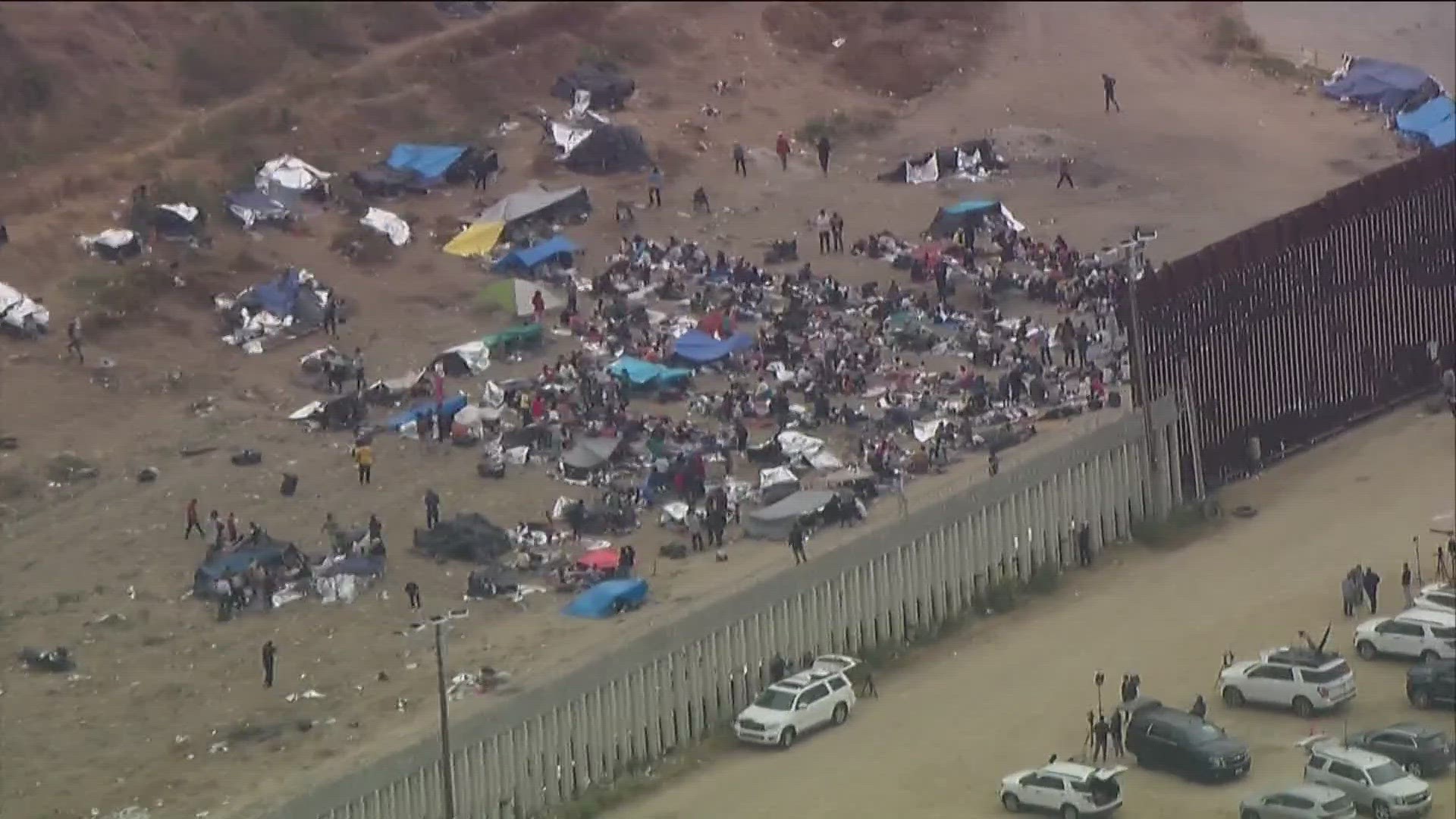SAN DIEGO — A new rule issued by the Department of Homeland Security presumes that migrants are ineligible for asylum unless they follow lawful pathways into the United States.
“People who arrive at the border without using a lawful pathway will be presumed ineligible for asylum,” DHS Secretary Alejandro Mayorkas said in a video posted on Twitter on May 11.
Days later, Mayorkas clarified during the Sunday television news cycle.
“It’s not an asylum ban. But they have a higher threshold of proof that they have to meet. That is a presumption of eligibility that can be overcome. It is not a ban,” Mayokas said on ABC’s This Week.
As it turns out, migrants who cross illegally can still claim asylum under Title 8.
When Title 42 ended, hundreds of migrants waited for days between the border walls west of San Ysidro, technically on U.S. soil, meaning they had crossed unlawfully, most of them without making an appointment on the CBP One app.
“People with phones that are no longer charged cannot make appointments. People with old phones that can't handle the app cannot make appointments. Those struggling with Wi-Fi cannot make appointments,” said Pedro Rios, director of the American Friends Service Committee.
Rios spent the week following the end of Title 42 handing out food and water at the border to migrants being held between the walls.
“If they express fear, then that should trigger a process by which they will be considered for asylum,” said Rios.
Women and children were the first to be loaded into Border Patrol vans at the border. Later, single male adults were picked up until the border wall encampments were eventually cleared out.
Families with children were transported in buses to Border Patrol stations all over San Diego County.
Adults with no children were taken to a $15 million processing center in Otay Mesa.
The migrants first undergo initial screening, a critically important questioning session conducted by a Border Patrol agent. No attorney is present.
Depending on how migrants answer these initial questions, they could be deported and banned from seeking asylum for five years. Or, they could pass the test and get a chance to stay in the United States, according to San Diego immigration attorney Tammy Lin.
“Why are you here in the U.S.? Have you been harmed in your country? Do you fear harm in your country? Based on what they say, they'll either be expeditiously removed, and the process is over, or they'll get to the next step with ICE and potentially with an asylum officer to do a credible fear interview,” Lin said.
The credible fear interview is more in-depth and establishes whether asylum seekers fear persecution or torture in their home country.
Migrants also get a criminal background check, a medical screening, and a date to appear in court.
“Most asylum seekers are adamant about getting to their court cases. They want to get their day in court. They want to be able to have their case heard by a judge,” said Lin.
Once they get a court date, migrants are bused to one of several hotel shelters in San Diego and Imperial Counties run under a state of California contracts by Catholic Charities or Jewish Family Service.
Migrants stay in these hotel rooms for just a few days to shower, charge their cell phones, and speak with relatives.
At this point, they are free to go.
“All the folks we see at the border are not staying in our communities. Most of them are going to other parts of the country,” said Lin.
Some leave the hotel shelter in an Uber or taxi. Others are transported in charter buses out of San Diego County to cities all over the country.
Many migrants are bused to San Diego International Airport, where they get help printing boarding passes and then fly away to live with sponsor families.
Some will have to wait two or three years for their final hearings in immigration court.
Customs and border protection emailed CBS 8 the following statement:
"The orderly and safe processing of all arriving persons, our personnel, and the surrounding communities is paramount. Both Office of Field Operations and the Office of Border Patrol, which fall under CBP, will process all noncitizens under Title 8 authorities, including processing noncitizens determined to be inadmissible to the United States for appropriate immigration enforcement action. Processing dispositions for noncitizens without documents sufficient for lawful admission will be determined case-by-case. CBP wants to encourage noncitizens without documents sufficient for lawful admission to use the CBP One mobile app to schedule their arrival to avoid long wait times. The use of the app will streamline wait times for processing. Scheduling an appointment in CBP One provides a safe, orderly, and humane process to access ports of entry rather than attempting the dangerous journey to cross between ports of entry."
WATCH RELATED: Border Patrol clears out migrant campsites in Jacumba Hot Springs

